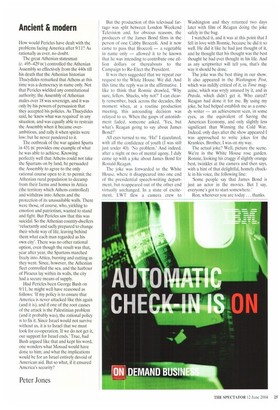Ancient & modern
How would Pericles have dealt with the problems facing America after 9/11? As rationally as ever, no doubt.
The great Athenian statesman (c. 495-429 BC) controlled the Athenian Assembly so effectively from the 440s till his death that the Athenian historian Thucydides remarked that Athens at this time was a democracy in name only. Not that Pericles wielded any constitutional authority; the Assembly of Athenian males over 18 was sovereign, and it was only by his powers of persuasion that they accepted his policies. As Thucydides said, he 'knew what was required' in any situation, and was equally able to restrain the Assembly when it became overambitious, and rally it when spirits were low; but he never pandered to it.
The outbreak of the war against Sparta in 431 BC provides one example of what he was able to achieve. Knowing perfectly well that Athens could not take the Spartans on by land, he persuaded the Assembly to agree to the only rational course open to it: to permit the Athenian rural population to decamp from their farms and homes in Attica (the territory which Athens controlled) and withdraw into Athens and the protection of its unassailable walls. There were those, of course, who, yielding to emotion and patriotism, wanted to stand and fight. But Pericles saw that this was suicidal. So the Athenian country-dwellers 'reluctantly and sadly prepared to change their whole way of life, leaving behind them what each man regarded as his own city'. There was no other rational option, even though the result was that, year after year, the Spartans marched freely into Attica, burning and cutting as they went. Since, however, the Athenian fleet controlled the sea, and the harbour of Piraeus lay within its walls, the city had a secure means of supply.
Had Pericles been George Bush on 9/11, he might well have reasoned as follows: 'If my policy is to ensure that America is never attacked like this again (and it is), and if one of the root causes of the attack is the Palestinian problem (and it probably was), the rational policy is to fix it. Since Israel would not survive without us, it is to Israel that we must look for co-operation. If we do not get it, our support for Israel ends.' True, had Bush argued like that and kept his word, one wonders what Mossad would have done to him; and what the implications would be for an Israel entirely devoid of American aid. But so what, if it ensured America's security?
Peter Jones


















































































 Previous page
Previous page